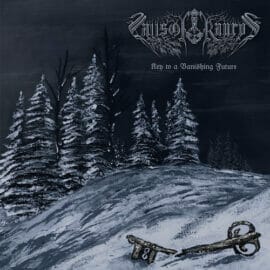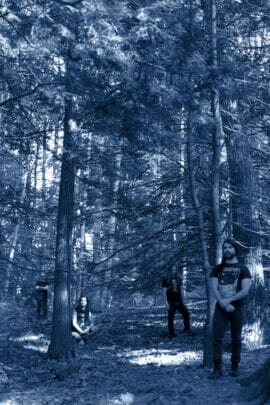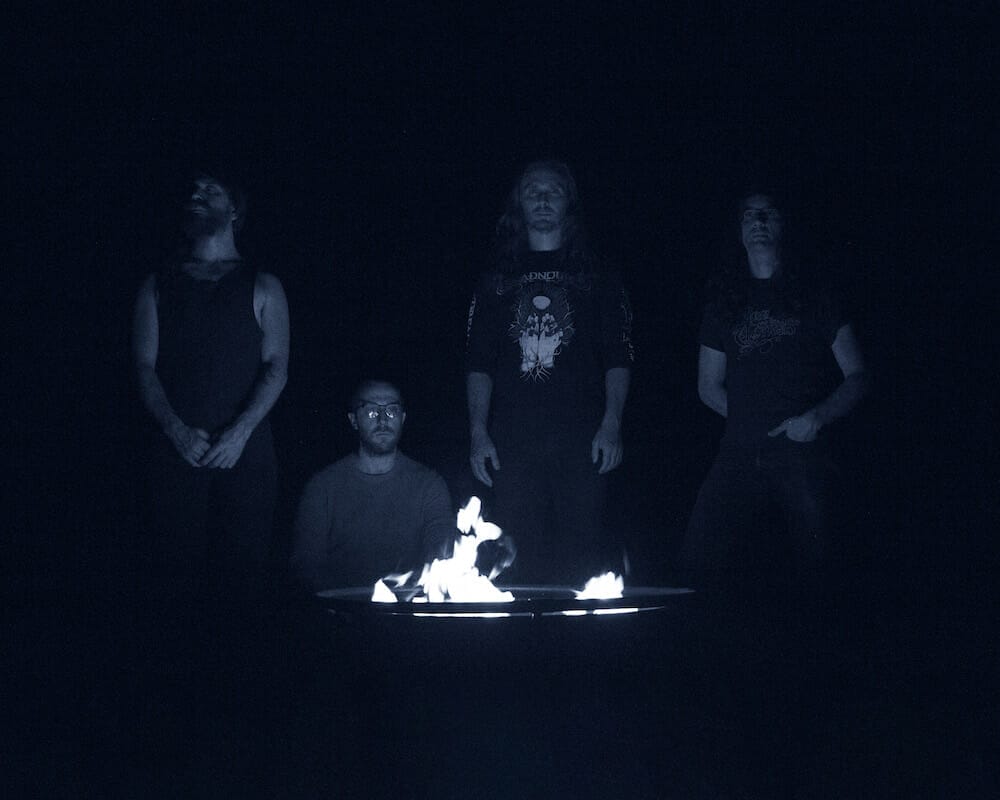For a band with an impressive discography like FALLS OF RAUROS it is not easy to surpass themselves. Although „Key To A Vanishing Future“ doesn’t have to be considered their masterpiece, the sixth album of the American folk-black metallers is a fascinating album in every respect. We had Jordan Guerette and Aaron Charles answer some questions on the occasion of the record’s release. In the following interview the two singers and guitarists explained to us why FALLS OF RAUROS named themselves after a place from „The Lord of the Rings“ without singing about Middle Earth in a single song, why topics like poverty are hardly ever addressed in metal and what the band has done differently on their new album.

You have your new album out with „Key To A Vanishing Future“ – a prophetic title considering how much the world seems to be on the brink at the moment because of the climate crisis, the pandemic and conflicts like in Afghanistan and Ukraine. How are you coping in these difficult times?
Aaron: All things considered, I’m coping with it alright. It can be tough sometimes to remain positive. We wrote the new album during the pandemic with no plans of playing shows, nor could we even go to a studio to record it, so we had to resort to recording it ourselves. And recently, as the album finally approached its release date, the conflict in Ukraine broke out. It feels strange to promote a record at such a time; releasing music feels like such a small, almost self-centered, thing to do. But music also keeps the heart and mind occupied, and being able to focus on something productive is probably healthy.
Jordan: The suffering of the people across the world due to conflict, disease, and income inequality, as well as the degradation of environments for plants and animals to thrive in is crushing to the spirit. That being said, I agree with Aaron, things are personally good for me and most of the negative consequences of the pandemic were anxiety and feelings of isolation. So compared to many others, I had an easy time with it.
Your name refers to a waterfall from J.R.R. Tolkien’s fictional world „Middle Earth“. However, in your songs you don’t just retell stories from Tolkien’s works, rather you deal with all kinds of essential topics. To what extent does this name still reflect your work?
Aaron: We don’t have a single song in the history of the band that retells stories from Tolkien’s works, or even references them in the slightest. Our band name is the only reference to Tolkien you’ll find. That said, we still feel like the band name is suitable in that it references a natural phenomenon, calling to mind the majesty and power of the natural world, as well as the ephemerality of human existence. If you also consider the events that happen near the Falls of Rauros in the novel, then themes such as human corruptibility and weakness, as well as strength and beneficence, enter the picture. These are all themes that are fair game to be included in our lyrics. So yes, perhaps our name gives people the impression that we are a fantasy-based band, but nonetheless I think it’s a fitting name for what we do.
 With what goal did you approach the work on „Key To A Vanishing Future“?
With what goal did you approach the work on „Key To A Vanishing Future“?
Aaron: Our first goal at the outset of writing any record is that we want the record to have its own personality. It should sound like us, but it should also sound fresh and unique amongst our catalog. I think we’ve always achieved this to some degree, but I would say „Key To A Vanishing Future“ is the most obvious step in a different direction. Another goal we had was to challenge ourselves creatively and not just go through the motions. We didn’t want to try and beat „Patterns In Mythology“ at its own game; it made more sense to try something new. We had other goals in mind too, which we must have succeeded in accomplishing based on some questions you ask later on.
In what way have you evolved on the new album from your point of view?
Aaron: On „Key To A Vanishing Future“ we decided to focus on rhythm and rhythmic hooks a little more closely than we have in the past. We feel like rhythm is underemphasized in black metal and black metal-adjacent genres, which tend to prioritize atmosphere and melody. We didn’t want to sacrifice atmosphere or melody, but simply pay attention to the songs as they develop and make sure there are some rhythmic hooks and motifs sprinkled throughout. Nothing too fancy or technical; even the simplest rhythmic hook goes a long way in elevating a song. Another evolution was the increased presence of synthesizers. We’ve slowly been incorporating more and more synths into our records, but I think this new record has our best synth lines and sounds.
Jordan: In addition to everything Aaron said, I think embracing new influences that we hadn’t worked into our sound yet. It’s exciting to me when sounds that we’d previously “reject” on earlier releases start to feel comfortable and right in our sound as it evolves. Some moments of “Known World Narrows” are the most obvious, but even some of the riffier parts of “Poverty Hymn” we wouldn’t have written even on our most recent previous album.
To me the record seems a bit more intricate than your previous releases. Did you want to challenge yourselves more?
Aaron: Definitely! We never want to prioritize technicality, and there are countless instrumentalists that can play circles around us, but we thought it would add excitement and flavor to the music if it was a bit riffier. Having some tight, palm-muted riffs in 7/8 or 9/8 time sounds comparatively intricate compared to our past releases. We also rarely like to have both guitarists play the same part, so usually you’ll hear at least two distinct parts weaving around each other. I don’t necessarily see us continuing to get more and more technical, but thinking outside of our usual box is both challenging and satisfying.
At the same time, the songs are a bit more balanced than before – there are no intros or interludes, nor are there long tracks over 10 minutes long. What inspired you to write more songs of similar proportions this time?
Aaron: This was another new idea for us, and we discussed it before starting to write the album. Since it’s our sixth album, we really felt like we should try our hand at some shorter songs, but we didn’t want to truncate them so much that they’re no longer effective. We always aim to have our records fit onto a single LP, so we figured we could ditch the intro/interlude tracks and fit 3 songs per side that fall between 6-8 minutes each. That’s still plenty long to allow development, especially since we tried not to cram everything into each song. On previous albums we’d have 10-12 minute songs that span every emotion, but here we allowed songs to focus on a smaller set of timbres and emotions. For example, “Clarity” is the opener, and we decided it made sense as an opener because it’s more of a “rock out” song. It’s not overly emotional, it’s not a tearjerker or whatever. It made sense to focus on some of those other emotions later in the album arc.
The bass stands out very clearly on the album – rather a rarity in black metal. Why did you want to give this instrument more space on the record?
Aaron: This is another intentional development, and it stems from the fact that we wanted to pay more attention to rhythmic hooks. It seemed like the right approach to have audible bass working closely in tandem with the drums to create interesting rhythmic ideas. The guitars could be playing some harmonically dense tremolo picked wall-of-sound part, while the bass and drums do something else altogether. We all love the bass guitar and what it adds to music, but in extreme metal it’s most often used to double up the guitars to make the band sound heavier. That works like a charm, but we prefer to have the bass play counterpoint or lock into a groove with the drums. It makes the music less monolithic, but groovier. We’ve never tried to be the heaviest band around anyway.
Jordan: Evan (our bassist) killed it on this album, and I’ve been happy to see reviews and interviews mentioning his playing. I’ll say that I don’t actually think the bass approach is that different from the last few albums, but maybe the production allows it to be heard more clearly and he’s certainly been constantly refining his approach. But there are bass moments that I really love all across our discography, and I thought the bass production is as good on „Patterns In Mythology“ as it is on „Key To A Vanishing Future“ – I’m curious if anyone will go back and notice the creative bass playing on Patterns now that they’re listening for it.
 Your music has been associated mainly with black metal, folk and post-rock. However, on the new album there seems to be a bit of death metal as well. Have you developed a greater interest in the genre?
Your music has been associated mainly with black metal, folk and post-rock. However, on the new album there seems to be a bit of death metal as well. Have you developed a greater interest in the genre?
Jordan: We’ve all been listening to death metal since before the beginning of FALLS OF RAUROS. I know that Aaron and Ray (our drummer) especially have been big death metal fans all along – Ray has been playing in (awesome) death metal band Shabti for many years. I have personally been listening to more death metal (especially Immolation and Gorguts) the past few years and during the writing of „Key To A Vanishing Future“.
Aaron: Yeah, death metal was my first love as far as extreme metal is concerned. I started with melodic death metal back in the early 00s and quickly got into more brutal stuff like Nile, Suffocation, and Cryptopsy, as well as more atmospheric bands like Immolation and Incantation. If anything, I’m much less interested in death metal now than when I was a teenager. That said, it’s a genre I enjoy and still listen to sometimes. The riffing styles used in death metal are burned into my psyche and came out naturally when writing some “riffier” parts of the album.
Can you tell us what the titular key is that is mentioned in „Key To A Vanishing Future“?
Aaron: The key is simply a metaphor for inheritance, which can be a really broad topic. Looking at it with a wide lens, the key stands for everything that is passed down from one generation to the next. This includes social norms, religious beliefs, economic health, government structures, etc. It also includes things passed from parent to child such as physical and mental health, poverty or wealth, obligations, burdens, and everything else. It’s really such a broad topic that each song focuses on a different aspect but only barely scratches the surface. The lyrics on this album are only an exploration of the theme, not a rigorous analysis, and there are no concrete opinions or solutions offered.
Your song lyrics are mostly metaphorical and it’s not always obvious what is meant. Do you regret it when people don’t pay attention to the lyrics or don’t understand them?
Aaron: It doesn’t bother me at all. They are intentionally written to be metaphorical. I don’t have the answers to any of the questions being asked on this record; what’s important is that I thought about it, and listeners will maybe think about these concepts as described at the surface level. From song-to-song I am not offering much in the way of insight to the listener, but rather a nebulous series of introspective thoughts. It’s my hope that people will know very vaguely what the record is about, and that will be enough to let their imaginations take over, connecting to the album in their own way. I couldn’t tell you what most of my favorite metal records are about, lyrically, and I think that’s part of the allure.
Right-wing extremist views are unfortunately all too common in folk black metal – many bands spread harmful messages away from their work or channel them through symbolism in their art. Almost every label relevant to this style has at least one such band on its roster. How do you perceive the scene and how do you feel about it?
Jordan: It’s a bigger problem than I realized when I was younger, both in the “metal scene” and outside of it. It is important to not support those who use their platform to spread racism, misogyny, transphobia, ableism, or any other hateful ideology. To me, the wave of right-wing extremism that seems to be sweeping across the world is the “dying throes” of insecure white men feeling the world starting to shift away from them being able to do and say as they please with no consequences. Speaking from my experience living in the States, right-wing extremism is having serious social and legislative consequences – it’s honestly pretty fucking scary. The least we can do what our little platform is make it clear that we are in solidarity with women, BIPOC, LBGTQ+, folks with disabilities, and anyone else whose power is marginalized by our society.
What do you want people to take away from „Key To A Vanishing Future“?
Jordan: I basically hope folks enjoy it, or get some sort of emotional catharsis from it. It would be cool if music nerds noticed some of the harmonic or structural things we’re doing, but that’s secondary to the “feeling” of the music.
Aaron: I’ll echo Jordan on this one. Emotional catharsis is priority number one, but music nerds dissecting the record’s structure is always welcome. There are a number of spots where we snuck in hidden references to other songs on the album, for example the outro chords in “Daggers In Floodlight” are actually a riff from “Survival Poem.” It’s not at all obvious that this is the case.
I get the impression that your music is not particularly cerebral, but rather guided by emotions. Which album has really swept you away or touched you most recently and why?
Jordan: I have been digging „The Sediments We Move“ by Charlotte Greve/Wood River and „A jamais pour toujours“ by N Nao.
Aaron: I’ve always been wary of John Lennon’s solo albums due to the song “Imagine” and the fact that he’s kind of an insufferable person, but I’ve been listening to Plastic Ono Band a lot recently and it’s really doing it for me. The song “God” is incredibly powerful; it truly sounds like the death of the 60s. He brazenly renounces all the alt-spirituality hocus pocus of the psychedelic era, takes an openly atheistic stance, and renounces the celebrity-idolization that reached such a fever pitch with the Beatles. Such an intense way to usher in the 70s, and a beautiful album through and through.

With the song „Poverty Hymn“ you take up a topic that, strangely enough, hardly gets any attention in metal. Why do you think this problem is so hushed up in metal?
Aaron: I think it’s probably too “real” of an issue for many metal bands to want to approach it. A lot of metal is very escapist, with lyrics focusing on sci-fi, fantasy, horror, mythology, the occult, and whatnot. Bands that use anti-religious themes often do so from a Satanic or Pagan angle. All of these themes are escapist in nature; they transport your mind away from the real world. I think most bands that approach poverty and other social themes in their lyrics tend to be thrash and crossover bands. Maybe grindcore. Sub-genres that cling a bit closer to punk rock.
Being a professional musician is a financially precarious undertaking. The necessary equipment is expensive and only very few can even make a living with it. What experiences have you had in this regard?
Jordan: None of us make a living from this band at all. Not even close. We are fortunate in that enough people buy our records and merch and come see us on tour that our band
sustains itself. Of the four of us, I’m the only person that’s sort of doing music-related things for a living – I work as an audio designer in the video game industry, and I also compose for games and teach music lessons in addition to performing with FALLS OF RAUROS and my neoclassical/folk group Forêt Endormie. I’ve also begun playing classical guitar gigs, which I love. Making a living as a musician is absolutely doable, but making a living with one band is much, much more difficult – most bands need to tour non-stop, and even then the money is relatively little unless you cross a certain threshold of popularity.
Planning ahead in these times is certainly not easy. Nevertheless, do you already have an idea of what will happen next with FALLS OF RAUROS?
Aaron: Taking a short moment to breathe, but we all have things in the works.
Jordan: I’m recording a new album with my neoclassical/folk group Forêt Endormie later this year, and I know Ray is working on albums with Shabti and Obsidian Tongue, and Aaron has a record that he’s releasing later this year. Other than all those projects, FALLS OF RAUROS is looking toward future touring, potentially in 2023, to places we’ve yet to visit. No promises at this point though!
Let’s slowly come to the end of the interview. At this point I would like to do a short brainstorming with you. What comes to your mind about the following keywords?
(All answers by Jordan)
Music streaming: Accessibility, infinite choice (for better or worse).
Social justice: Every action is political, just by existing in a society we have a responsibility toward others, whether the individual person wants to shoulder it or not.
Genre labels: Helpful, not to be taken too seriously.
Optimism: Easier on a personal level than on a societal level.
Metal in the mainstream: Often disappointing and over-produced, sometimes great. I feel relatively neutral about whatever celebrity wearing a Slayer shirt, maybe it helps the underground, maybe not.
Wilderness: Essential, terrifying.
Finally, thanks again for your answers. Would you like to say a few more words to the readership?
Jordan: Thanks for having us, we really appreciate the opportunity to share thoughts about our music!
Aaron: Agreed. Thanks so much for the support! Be well!
Dieses Interview wurde per E-Mail geführt.
Zur besseren Lesbarkeit wurden Smilies ersetzt.
